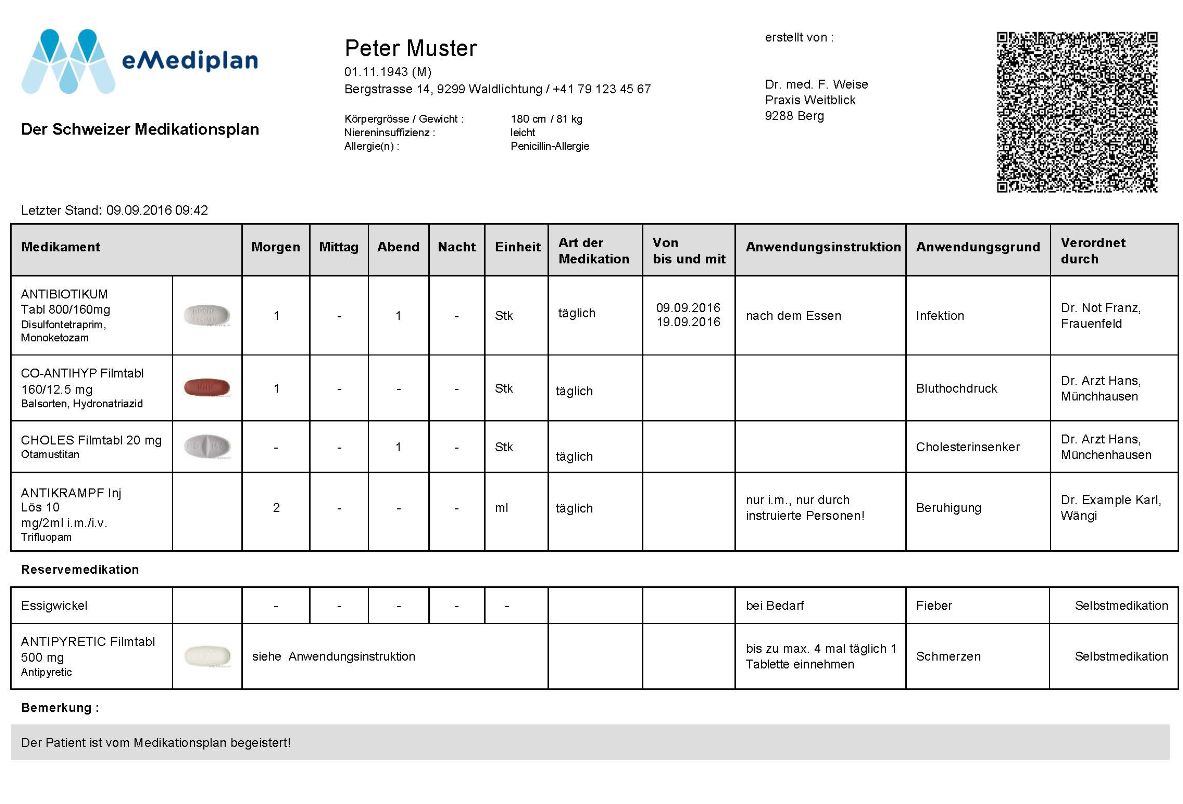Medication plans are a central pillar of any eHealth solution. To enable interoperability between eHealth systems in Switzerland, the organization “Verein eMediplan” was founded in 2016. Its aim is to support and provide public, open source, medication plan formats supported by a broad group of stakeholders from the public and private sectors.

CHMED16A describes the proposed specification and reference implementation of the object model for a medication plan, the so called CHMED16A.
The reference consists of two major parts:
This allows IT systems to store and transmit electronic medication plans as simple strings or text files in UTF-8. It also makes it possible to transmit the mediplan print-based through the use of QR barcodes. Therefore, the mediplan is readable by users and systems alike. This is necessary to guarantee a simple handling.
A typical CHMED16A object (QR barcode) would look like this:
CHMED16A1H4sIAAAAAAAEAMVU3W7TMBR+lcq3S4SPHdtx7raVAaKFqutAAnoREreJ2jpT4gKj6ptxx4txnCwVSKQSu0GVqvPX7+fIpwdyuXcFSYiSFCjloGKtNQnI2G
GRUZAh1SGwBUASyYTqC8oSSnHgVe4HZM7z1UqF6WcqwkhxjCKdhcJkWc650GIlcXZq8sXDvSEJtHGZpTtjXUOSj4cORyuIpWpRu0EekFnVDYzxmwbtZ+l13dTV7g9t5Ij1eZVicfYWMRab9byxmF1urMH8zpbezO3iNTkGj4RRJIHH7Bwj/J2RhUAHGa+2e/fF1PnPH9bu7XqAnHEhZHzGrqeGJ5EXVVbk9T7bfHr20tTfBwRAxCQHen7f/y7guqi2pnGmLm1j7MbUA/Qx1VLz8/aftvvf7L9Pm2ZQAQgBTEX/QwL+dJa6Et8/SQ7kqr0z0DGEFPxbDsh16R48lqktZjdv8FYwnabfyl2KhRfG5giasIBMTj3nWp4JPrmEjJ93J+fxx5PGTY3X1tbSzuHpGDthCPUu3eKM4O2Kujbr29C3QcSd9ex0udibYyKUWvbLZX3Au54EdupFfSD6QD4CCBEIBcsjjpJZUVnv6yJCxlEsYMRk+59z62pj/MLuLBreoe2vZj2KsfOhvMcyp0yhAzLfbbzj4y8tzloh3gQAAA==
In addition, the layout specification for the print-based layouts makes recognition of and work with medication plans easier for medical professionals and patients, as the documents will come in a universal layout, independent of the individual IT systems. Details
Disclaimer July 2020: HCI Solutions AG has built a converter for all software houses that have integrated the CHMED16A. The converter will be published here as soon as it is available. If you have any questions, please contact hotline@hcisolutions.ch directly.
FHIR is a standard in development from HL7. FHIR consists of a RESTFul API and a set of interoperability Ressources.
Extending the CHMED16A format to a FHIR based definition (CHMED20AF) has the following advantages:
The CHEMD20AF format can bei either in XML or JSON format.
In the section Introduction the structures for the different formats/values are explained.
Download: You can download this implementation guide in npm format from here.